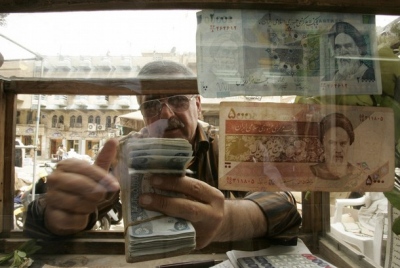 Marcus George >
Marcus George >
One note --- there is an addition to the quote that George used from our discussion, "Bahmani is a firewall for Ahmadinejad. If he is forced out, then the President may be next in line to take the blame for the economic situation."
The full quote: "Bahmani is a firewall for Ahmadinejad. And the President is a firewall for the Supreme Leader."
The Iranian rial has dropped sharply on the open market since Sunday, following speculation the central bank chief could be sacked in a row over his performance which has exposed Iran's political faultlines.
Bank governor Mahmoud Bahmani --- appointed by President Mahmoud Ahmadinejad in September 2008 --- has faced strong criticism by MPs since the rial lost 40 percent of its value in a matter of days during a slump last September.
Reuters contacted currency traders who offered the rate of 35,400-36,250 to the dollar on Tuesday, little changed from Monday but down some 8 percent from Sunday, when reports of Bahmani's possible departure first emerged.
"The Iranian currency had weakened a bit in December but this (latest) slump was fuelled by uncertainty over the situation of the central bank," said Scott Lucas, an Iran expert at EA Worldview, a website that monitors Iranian media.
Bahmani offered to resign on Sunday saying he wanted to retire, but Ahmadinejad refused to accept it. The same day parliament voted to investigate the central bank's response to last year's currency crisis.
Legislators accuse the bank of economic mismanagement and failing to provide the market with enough dollars to meet demand, helping to drive down the rial.
Sunday's moves were followed a day later by a Supreme Audit Court ruling that Bahmani should be dismissed. While the order is non-binding, it appeared to send the rial into a new dip.
Neither Bahmani nor Ahmadinejad have made any public comment about the future of the central bank chief since the weekend, and it is not clear who might replace him were he to go.
The volatility in rates and difficulties in making transfers have crippled businesses that import goods from abroad because of slackening demand.
"Sales are dropping. My customers are waiting until the exchange rate is better before buying," a Tehran-based IT trader told Reuters by phone. "It's been like this for months."
PRICES ROCKET
The economy has taken a battering since the introduction of U.S. banking sanctions a year ago that virtually severed the country's links to the global financial system.
As a result Iranians have seen the price of food and goods rocket and their spending power slump, especially regarding imports which are directly affected by the weakening rial.
Mohammad, an Iranian businessman in Isfahan, said the price of a Nissan Maxima in Iran had nearly quadrupled in the last 10 months to around 1.2 billion Iranian rials ($35,000).
"These are blood prices," he told Reuters by email. "No matter how hard we work, there's no money in it for us."
Some analysts see the lawmakers' criticism of Bahmani as an indication of Ahmadinejad's faltering influence within Iran's multi-tiered political structure, following a public spat with Supreme Leader Ayatollah Ali Khamenei in 2011.
Bahmani also faces claims of involvement in a March 2012 incident known in Tehran as the "midnight withdrawals", when the central bank withdrew several billion dollars from commercial banks without authorisation.
Monday's Supreme Audit Court ruling was issued because of Bahmani's failure to attend a hearing and explain the reasoning behind the March 2012 withdrawals, Mehr news agency reported.
The central bank has said no such ruling was issued by the court - whose members are appointed by parliament --- adding to the uncertainty. The bank denies any wrongdoing over the withdrawals.
A separate report on the state news agency (IRNA) said that the governor had 20 days to appeal against it.
AHMADINEJAD "MAY BE NEXT"
While Ahmadinejad cannot stand for re-election in June, a series of sustained attacks on his economic management by MPs are designed to neutralise any influence he may be able to wield in the forthcoming presidential poll and beyond, analysts say.
"Ahmadinejad's critics are looking to erase all vestiges of his power," said EA Worldview's Lucas.
"Bahmani is a firewall for Ahmadinejad. If he is forced out, then the President may be next in line to take the blame for the economic situation."
The Central Bank has given no official reason for withdrawing 3.5 billion dollars at the end of the last Iranian year, in mid March 2012. Bahmani has dismissed reports the funds were used to help the government pay monthly cash subsidies.
To stem the September plunge in the currency, the government used security forces to arrest currency dealers and attempted to impose its own exchange rates.
The crackdown has made it difficult for many dealers to continue trading. Those that continue risk arrest and imprisonment as well as losses because of unpredictable swings in the market rate.
In December 2011, the rial traded at around 10,500 to the dollar. It hit its lowest level of around 37,500 at the beginning of October, 2012.